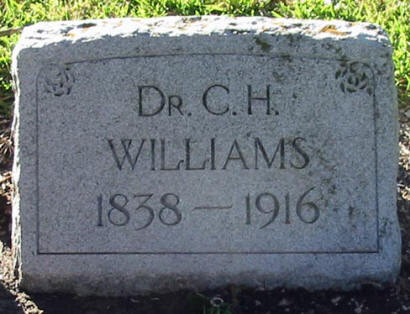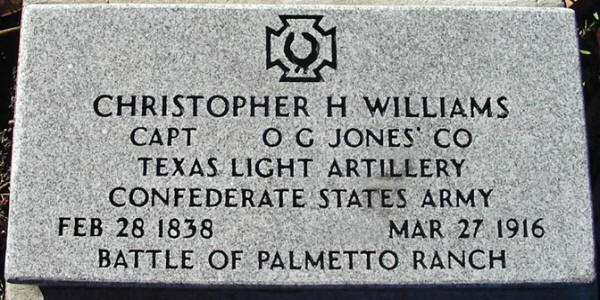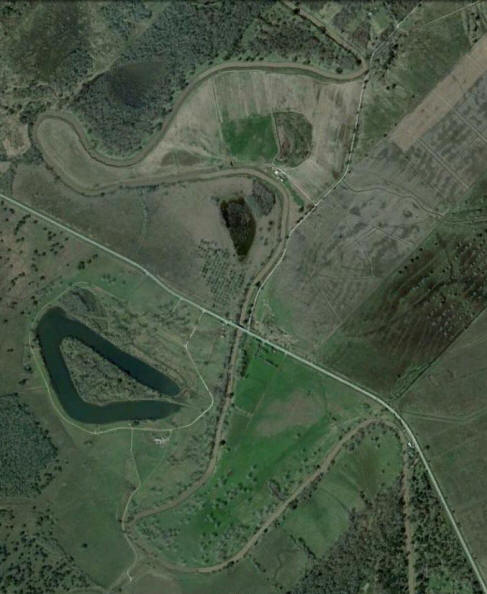|
Come, therefore, to Rotherwood, not as a guest, but as a son or
brother. |
|||
|
|
|||
|
Mary L. White was born in 1815 in Knoxville, Tenn., whence she came with her father, the late B. J. White, to Texana, Jackson County, Texas in 1830. Mr. White settled first with his family on the Navidad. In 1833 she was married to Colonel Robert H. Williams of Caney, Matagorda County, Texas. In 1859 she was confirmed by Bishop Gregg in Christ Church, Matagorda, and thus became a member of the Episcopal Church, of which she continued to be a firm, consistent and devout member to the day of her death on January 2, 1888. Polly Rugeley Fitz-Gerald in recounting early recollections of her childhood in Matagorda County had this to say: San Antonio has been my home for fifty years, but my fondest memories are those of Old Caney in Matagorda County. My grandfather was the well known and beloved [Christopher Harris] "Kit" Williams of that County. His father, Robert H. Williams, was on of "The Old Three Hundred," who settled Texas in 1823 and was given a land grant of 4,428 acres. The grant is listed as the R. H. Williams Survey No. 44 and was signed by Stephen F. Austin. My father was John Lamar Rugeley and my mother was Laura Roberta Williams who were both born in the "Deep South of Texas" between the Brazos and the Colorado rivers.
During my life on the plantation I had no playmates except a young black girl whose duty was to safeguard and amuse me. She taught me much about the life there, but my greatest teacher and confidant was my grandfather. He was a lover of nature and he had no difficulty in imparting that love to me. He taught me the habits and haunts of the birds--their calls and colors--their migrations--their coming in the Spring and their departure in the Winter. The woods around here were filled with animals of all kinds and I knew them well. I learned, too, of plantation life in general--the beauty of a cotton field in bloom stretching as far as the eye could see--the smokehouse with hams, sausages and bacon hanging from the rafters, the dirt floor, the thin spirals of smock ascending to complete the curing process; the tall corn and the sugarcane growing, and the small tobacco patches from which the servants cured and manufactured their own tobacco. On Sunday morning we had religious services which consisted of reading a chapter from the Bible or Prayer Book as there were no nearby churches. We were all Episcopalians. After the little service at home we spent the day, if we had no callers, visiting nearby plantations. We, of course, went by horse and buggy. Among those I recall are the Bowie, Le Tulle, Thompson and Box plantations also jaunts to Wharton, Bay City and Matagorda. These were great events in my young life, first of all because I was related to everyone in the County having the distinction of having been born a Rugeley, and secondly these visits away from "Rotherwood" gave me the opportunity to play with other children. Another thrill was going to the general store at Hawkinsville and also visiting the beautiful old plantation home. Oak trees with hanging moss covered many of the roads through the woods on these trips and now and then we would come to a wide open prairie where yellow, pink and white buttercups grew along with Indian paint brush, and I had to be restrained because I wanted to stop and pick them. If they didn't stop I would resort to tears which halted the buggy immediately for I can never remember my grandfather denying me anything; so I was allowed to pick flowers to my heart's content. I well remember the first automobile I ever saw, Rowland Rugeley and the Hawkins girls (Meta, Janie, Lizzie and Elmore) all cousins, came down to visit us for the day. They honked the horn with great gusto to show off the car, and the horses and mules were scared to death, running wildly around their pastures and attempting to jump the high barbed wire fence which enclosed them. Many of them were severely cut and after the departure of the visitors, my grandfather with several of the blacks spent hours treating and sewing up the wounds. It must have been around 1906 or 1907. There were few automobiles then, and none to my knowledge had ever been down to Caney before. No wonder the poor animals were frightened. At the entrance to lovely old "Rotherwood" there were two cannon balls adorning the front gate, one on either side. My grandfather picked them up on the beach after the Civil War. I remember, too, the blue lightening rods on top of the house. The entrance hall was covered with deer skins and there were antlers all around the wall. They were trophies of my grandfather. It also contained his desk which had been in the family for generations. Above the desk hung a saber taken from a dead "Yankee" which he had sought to return after the Civil War. However, he was unable to locate the heirs. Three or four double barreled shot guns were always behind the front door (a holdover possibly from the Indian days). There was also a huge medicine chest from which all medicines were dispensed to anyone ill. I can see the parlor now; Pampas grass--jardinieres on the mantle; family portraits all around the room on easels; an enormous bookcase with glass doors containing the classics and a stereoscope with selected views which I was allowed to look through on special occasions. These were the days of kerosene lamps, cistern water purified by charcoal, the only drinking water available. Back of the house was a lovely orchard of pear, peach and plum trees, a glorious sight when in bloom, watermelon and cantaloupe patches. Near the kitchen was a tiny garden of tomatoes, onions and herbs. I love to watch the rabbits nibble on the lettuce and would never tell grandfather that they were there, as he would chase them away. Between the house and the lake was a family cemetery with an iron fence surrounding it. Two miles from the house was a large lake stocked with all kinds of fish and no one could fish there without my grandfather's permission. It contained a small island covered with maiden hair fern and wild violets, and sometimes he would take me over there in a small row boat.
He always took a gun along, for the lake was full of alligators and he would fire to scare them away if they came too close.
These are some of my childhood memories of that delightful spot, my heritage and that land I shall always cherish. When we visited the family cemetery, Rotherwood last summer, the manager of the plantation told us that one night several winters ago someone drove a truck into the cemetery and carried away all of the old tombstones except one large stone that had fallen over during the last storm. It was almost buried under the trunk of a huge, old tree. He told us also that stones were frequently stolen from deserted plantation cemeteries, the engravings removed, and used again. Rotherwood itself met the fate of so many of the plantations on Caney; it was burned so many years ago that only a gnarled old sweet myrtle stands to mark its site. Thus our only memory of it comes from little Polly's story.
21 Sons For Texas by Arda
Talbot Allen, pp. 39 - 42 |
|||
|
Dr. Williams was the oldest native of Matagorda county, and for full half a century was an active, useful and honorable citizen of the county, seeking no office but lending influence always and in every way to the public welfare. He has been failing in strength for the last two or three months. He spent a week here about ten days ago the guest with his wife of Dr. and Mrs. H. L. Rugeley, and feeling better returned to his home at Gainesmore. One day last week Dr. Rugeley, hearing of his illness, went down and on Saturday brought his life long friend to the hospital, where on Monday he peacefully bid adieu to wife and friends and his spirit took its flight to the God who gave it. Robert H. Williams, father of Dr. C. H. Williams, was born in Caswell county, N. C., Oct. 10, 1796, moved to Mississippi when grown, and from Mississippi, came to Matagorda county with one of Stephen F. Austin's first colonies, landing at Matagorda in 1823. He opened up a farm on Caney in 1824, maintaining his home in Matagorda for many years. There in 1825 he was appointed by the Spanish authorities of Mexico the first alcalde for this section of Texas. He was elected a delegate to the convention which sent Austin on a mission to Mexico, was in several fights with Indians, and was wounded in the battle with the Mexicans at Velasco May 17, 1832, where he lost one eye from gunshot wound. Mr. Williams was married to Miss Mary Lawson White, daughter of one of the signers of the Texas Declaration of Independence. He was in the civil war and like most of others lost all in that conflict but his plantation. Dr. Williams was born February 28, 1838, at their home in the stockade on the Caney plantation. Educated at Nashville and in the Louisiana School of Medicine at New Orleans, he returned to planting in 1850, and to the practice of his profession. In 1861 he enlisted for the war, and was appointed by President Jefferson Davis, First Lieutenant, reporting to General Hebert at Houston. He saw service in Louisiana and Texas, with the troops defending the coast, having charge of the garrison at the mouth of the Brazos for a while. For many years a couple of shells which were fired at him from a Federal gunboat ornamented his gate posts on Caney. Later he was promoted to a captaincy. At the close of the war he was married to Miss Theresa Herbert, daughter of Dr. Herbert, a native of this county, to which union came four children., two living:--one the wife of James Spillman [Spillane], well known New York editorial writer, and Mrs. Johnnie Rugeley of Houston. Mrs. Williams died in 1873.
The Dr. was not a member of any society or church, but his life was an open book of kindness and good deeds--an upright man, a patriotic citizen, a faithful friend, he was loved and honored by all with whom he came in contact. The funeral took place at the home of the friend of his boyhood, Dr. H. L. Rugeley, the service being conducted by Rev. J. F. Carter of the Methodist Church there and at the grave in Cedarvale Cemetery. The pall bearers were: Judge Wm. E. Austin, D. P. Moore, Louis Le Tulle, Judge W. C. Carpenter of Bay City and Geo. B. Culver and F. L. Rugeley of Matagorda. At the conclusion of the service, the grave was covered with tokens of affection and esteem. Spring's choicest flowers, Love's most beautiful token.
Matagorda County News & Midcoast Farmer, March 28, 1916 |
|||
|
In Buckner's Prairie reside Messrs. Ira W. and C. A. Spencer, who own considerable landed property in Matagorda....Here, too, resides Dr. C. H. Williams, who in addition to his large medical practice superintends the cultivation of a large plantation in corn and cotton. He also owns a plantation on the Brazoria side of the line. Dr. Williams is a live, public spirited man, and says he is ready to do his part to secure the railroad.
The Daily Tribune and The Matagorda County Tribune,
Century of Progress Edition, Section Four,
August 26, 1937 Quoting a publication of a newspaper, The Old
Capital, published in Columbia, Texas, Saturday morning, July 14,
1888. |
|||
|
|
|||
|
Dr. C. H. (Kit) Williams, a life-long citizen of Matagorda County, a Confederate veteran and a man of many splendid traits of character and possessed of scores and scores of friends, died yesterday afternoon at the home of Dr. H. L. Rugeley, in this city, and was buried in Cedarvale this afternoon under the auspices of the E. S. Rugeley Camp, Confederate Veterans, and in the presence of a number of sorrowing friends. Although on the streets a few days ago, Dr. Williams has been failing for several months. Decedent was born in Matagorda County, February 29, 1838, and before his death was the oldest native of the county. He lived in this county when Texas was a republic and when Matagorda was the most important town in Texas with the exception of San Antonio. At that time Matagorda was the shipping port of all the country from Bastrop to the coast. He received military and literary training at Nashville, Tenn., between 1845 and 1854, and entered into the practice of medicine. When the war "broke out," owing to the fact that Dr. Williams had received a thorough military training, he was appointed drill master and spent a great deal of his time training young soldiers in the [art] of warfare and preparing them for the [great] conflict. He enlisted in Jones Light Artillery and was made 1st Lieutenant. [Later] Capt. Jones was promoted to the rank of major and Dr. Williams was made captain. Dr. Williams was married three times, to a Miss Herbert from which union two daughters were born, Mrs. Stlaine [Spillane] of Brooklyn and Mrs. Bert Rugeley of Houston. His second wife was Mrs. Hite [Heidt] and a son blessed this union, Carlisle Williams of San Antonio. His third wife, who survives him, was a Mrs. Gunn, whom he married in Virginia. Dr. Williams was a typical Southerner and Texas, and educated, polished gentleman of the old school, kindly of disposition, unassuming and a close friend to everyone. He stood high in the estimation of is fellowmen and never failed to have a good word for his people and his country.
A good man, a true friend, a loyal son of the Southland has gone to his eternal reward. Peace, Peace, be to his ashes.
The Matagorda County Tribune,
March 31, 1916 |
|||
|
Whereas, it has pleased Almighty God to call our friend and comrade Dr. Kit Williams to his final reward: BE IT RESOLVED. That Dr. Kit Williams was a polished, refined, cultured gentleman and affable, pleasant and agreeable to all who knew him and beloved and honored by a host of friends who loved him. That in his youth actuated by the true spirit of patriotism he entered the armies of the Confederate States as captain of a squad in Jones battery of artillery; that subsequently he became captain of his company and as such was present and participated in the battle of Galveston and witnessed and aided in the capture of the 'Harriet Lane;' that as a soldier he at all times did his duty and was beloved by his men. At the end of the war he returned to Matagorda County, Texas, where he was born, he being the first white child born among those who settled in this county. He is survived by his second [third] wife, a noble lady of refinement and polished courtesy and also a scion member of one of old Virginia's best families, and one son and two daughters. At the time of his death the doctor was 79 years old.
The Matagorda
County Tribune, October 6, 1916 |
|||
|
Galveston Daily News
(Houston) Sunday, Sept. 13, 1874, Iss 215,
Col 4 |
|||
|
Alice, Beloved wife of Dr. C. H. Williams, departed this life and fell on sleep at her home on Rotherwood plantation, near Coulterville, Texas, on Sunday morning, July 30th, 1899, in the 52nd year of her age. Mrs. Williams was a native of Dallas county, Ala., a daughter of Jones Gunn, a prominent manufacturer of that state. While on a visit to her sister, Mrs. Judge Rugeley, in this county, she met Dr. Williams, and their acquaintance resulted in their marriage at Bay St. Louis, Miss., in 1879. Of this happy union one son, Master Carlysle, now in his 15th year, survives. With him and the fond husband and other bereaved relatives and friends, we deeply and sincerely sympathize. It having been our privilege to know Mrs. Williams quite intimately and to enjoy the hospitality of her home, we have some knowledge of the depth of their affection for her, and some conception of their sense of loneliness without her. May God comfort them with the sweet assurance of a happy reunion in a higher sphere of existence! Mrs. Williams was a lady of singularly gentle, refined, and attractive personality, and the number of her friends equaled the number of her acquaintances. The malady of which she died was cancer; and though she was informed of its incurable character several months ago, she was as bright, pleasant, and cheerful to her friends and just as thoughtful for the comfort of her guests, as she had ever been. Indeed the patience and fortitude manifested under the most depressing circumstances were but the fruit of a well-poised, self-contained, and self-disciplined mental and spiritual being of more than ordinary force and culture. One of her nearest and dearest friends, Mrs. H. W. Bowie, who was with her almost constantly during her last illness, sends the editor of THE TRIBUNE a private account of this most trying period of Mrs. Williams's life, solely for our information and guidance in the preparation of a proper memorial; but his tribune from a friend is so beautifully and feelingly expressed, that we take the liberty of quoting the following extracts as a fitting finale to this memorial of our departed friend: "I was much struck with her beautiful resignation to God's holy will, and her great desire to suffer in union with our Lord on the cross. Her suffering indeed was intense; but the fortitude with which she bore herself through it all, evidenced a spiritual communication with her Heavenly Father, that was truly consoling. "Her desire to speak on spiritual things, and the great joy with which she ... words spoken to her concerning the happiness of her soul, we are sure marks of a foretaste of the sweet hope God gave her on the threshold of eternity. "During life all who knew Mrs. Williams got in touch with her refined manners, noble heart, and cultivated taste but these qualities were most feeling manifested as death drew near, in her affection for her husband and her son and, indeed all of her friends."
The Matagorda County
Tribune, Saturday, August 5, 1899 |
|||
|
"IF MATAGORDA COUNTY IS A GOOD FARMING COUNTRY, WHY HAS IT NOT BEEN SETTLED UP LIKE OTHER GOOD SECTIONS OF TEXAS?" THIS QUESTION IS ANSWERED BY DR. CHRISTOPHER H. WILLIAMS Every real estate man has tried to explain away the above puzzling question asked by most every person who is approached on the subject of immigration to this part of the Coast Country. The writer has never been able to give a satisfactory answer neither has he ever heard anyone else give a convincing reply till Dr. C. H. Williams consented to be interviewed by The Tribune man. The stranger will ask, "Who is Dr. C. H. Williams and how comes he, at this late day, to come forward with a revelation of this perplexing and yet important mystery. Dr. Christopher H. Williams is lovingly and familiarly called Dr. "Kit" by his many friends, who are as numerous as the old settlers and their descendants, in this county. He was born in Matagorda County, Feb. 29, 1838, and is the oldest living person born here. Dr. Williams is not a moss back. He is an educated gentleman of the old school yet as progressive as most men of half his age. He lived in this county when Texas was a republic and when Matagorda was the most important town in Texas, except San Antonio; when Matagorda was the shipping port of all the country from Bastrop to the Gulf; Austin's Colony, in this and adjoining counties to the north, was the most important English speaking sections of the State. Today, the mind of Dr. Williams is clear, and his every-ready wit is as keen and his memory as vivid as most men at thirty-five. He is at once, scholar, soldier and gentleman. His literary and military training was received at Nashville, Tennessee, between 1845 and 1854. It was in the latter year that the Gulf Coast was swept by a great tropical hurricane and the town of Matagorda was laid low--every house, except that of Dr. Williams' father. "This," said Dr. Williams, "was the first halt in the development of Matagorda County." Don't lose sight of this first "halt" in the progress of this country, because the events following are simply a repetition of the history of development in all countries of the world. Remember that the narrator of the story following this, is still living and that his father was one of the first colonists of English speaking people in Texas. This part of the country was the home of the Caranchua tribe of Indians in the childhood and early manhood of Dr. Williams; that tribe of Indians is extinct, but the doctor is still here. The only thing by which those Indians are remembered is Caranchua Creek and Bay in the western part of the county, yet in the memory of this grand old gentleman, they are as of yesterday. Also he remembers the bright future which then stood out before the white people who pioneered Matagorda County. In those days there stood in Matagorda a warehouse, 450 feet long by 40 feet wide, in which goods and supplies for the interior counties were stored. Many of the great ships of that day cast their anchors in the roadstead in front of Matagorda and discharged their cargoes of goods from foreign ports and took on the raw materials produced by the fathers of Texas' future greatness. You may ask why Dr. Williams and other old settlers have not spoken in behalf of this county before. Why should they? No one doubted the excellence of soils, climate or seasons here until recent years. All were prosperous and happy and contented. There were no failures among those that farmed and they farmed too. Those people knew their country and not until strangers came from the different points of the compass and employed methods of living and farming that would fail in any country, were there any doubts about the ability of any industrious family making a comfortable living here. Read Dr. Williams' story, treasure it in your memory and keep this copy for the future, when he is called to the Great Beyond. DR. WILLIAMS STATEMENT "I am not in habit of talking for publication; and see no particular reason why I, who have lived here all my life, except when in school and in the war, should be called upon for a defense of this county as a fine farming country. Farming was conducted on a large scale in this county before the war. In those days, crop failure was unknown. We raised corn enough to do us; potatoes to help feed the Negroes; sugar and cotton for money. "I now live on the farm that I bought from my mother-in-law at $25 an acre over fifty years ago and it was a bargain then. "To answer your question as to why this county has not been settled ere this, would take lots of time, should we go into details, but I think I can give sufficient reasons for this, by stating a few facts which are well known to the informed; and will meet and dispel every doubt from the minds of people who would be worth anything to this county. "I will [paper torn] slaves as was most all of the south. Almost the whole country lying along the banks of Caney Creek was in a fine state of cultivation as early as 1845. Poverty among white people was a thing of the past. The storm of 1854 did considerable damage, but the halt in the progress of the county, on this account, was only temporary. True, there were not a great many white people here, because there were then, not many people in Texas. The modes of travel then were slow aand involved many hardships unknown to the people of this age; they had to come, either by water or overland in wagons drawn, mostly by oxen. They usually and very naturally, settled in the most convenient part of the country. "Matagorda County is so peculiarly situated that it was almost inaccessible except by water. The Spanish, who gave it its name, approached it from the sea. The isolation continued till the railroads came just a few years ago. There was so much of Texas to be settled that the early settlers of this county gave the immigration business very little thought. [paper torn] ...were pioneers. They expected hardships and met them like men and women of the purest blood. It is different now. The people raised in the last half a century have inherited an easier berth than that of the forefathers; therefore when ordinary difficulties confront them they run from the responsibilities. "The greatest cause of the undeveloped condition of our county and one that will effect it for some time to come was the war between the States. As stated before, the farms of Matagorda County were worked by Negro slaves under the direction of the owners. When the war of the sixties came, this country had practically recovered from the storm effects of 1854; but the war was a different proposition. It left our people without either capital or labor. The recent slaves would not work and help their former masters unless he had money to pay them, which he did not have and had nothing to exchange for money. Supplies raised here just before and during the war were exchanged for Confederate currency which was worthless when the Confederate cause was lost. "The soils of Matagorda County are rich and yield its fruits, when planted and tended, in quantities as prolific as any soil on earth; so when our people and their children and the few Negroes who were willing to work, turned back to our long neglected fields, the future began once more to look bright. Then a few industrious people began to drift this way. These brought others; soon it was discovered that this was a good rice country; also a good cotton country, which facts were well known to the old settlers. These discoveries by the outside world interested railroad builders; then came land speculators and with them came most of our troubles. "People of other States were told in fancy language on beautifully printed literature that all they had to do was to come to Matagorda County, make a small payment on land, plant orange trees, fig trees and rice and sit down and the world would lay fortunes in their laps. When the poor fellows came here and found that they must work and save and wait, their disappointment was so great that many of them could not stand it, so they left many, many of them in worse condition than they came. Then they began to cry down the country when in truth, their failures were due to their own misconceived ideas and to the lack of practical methods of living and farming. "I do not concur in the idea that our lands are too high in prices; although I sold a league of land where Lane City now stands for fifty cents an acre. I did that because it was not producing anything. You understand that land is the basis of all wealth. I was not in position to develop the land, hence it was of no value to me. I had all I needed on the home place which I have occupied since 1861. I sold another quarter of a league between Bay City and Matagorda on the Colorado, for twenty-five cents an acre. Another north on Caney Creek at the same price. "I am glad to see people of the right kind come into our midst. I would rejoice to see this county settled in small farms--for that is what it is best suited for--and to see all of the waste places utilized for the benefit of the world. I am confident that those who have gone away and those that are still to go, will soon regret that they did not stay with us and help us develop Matagorda County and enjoy the prosperity that is coming in the very near future."
The Matagorda County
Tribune, Friday, January 7, 1916 |
|||
|
On last Monday morning the elegant Rotherwood home of Mr. and Mrs. C. H. Williams caught fire from a defective flue and the house was saved simply because it was daylight, there was plenty of help there and it was discovered before it had burned through the roof. The fiaught (sic) [fire caught] between the ceiling and roof and by getting on top of the house and chopping a hole through the roof it was soon under control and the damage was slight. Nothing but the fact that everything was favorable and that heroic efforts were made at the right moment saved the place.
|
|||
Cedarvale
Cemetery, Bay City, TX |
|||
|
|
|||
|
|
|||
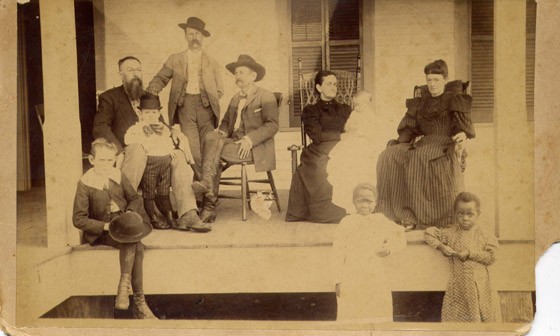
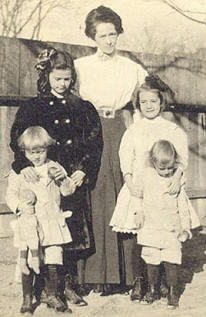 I
was born and spent my very early childhood on my grandfather Williams'
plantation, "Rotherwood," situated below Bay City about eighteen miles
from the Gulf and right on Caney Creek.
I
was born and spent my very early childhood on my grandfather Williams'
plantation, "Rotherwood," situated below Bay City about eighteen miles
from the Gulf and right on Caney Creek.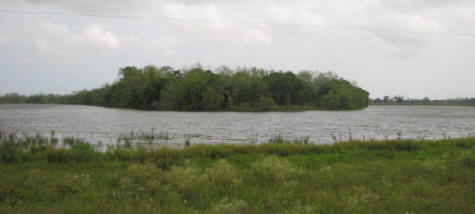
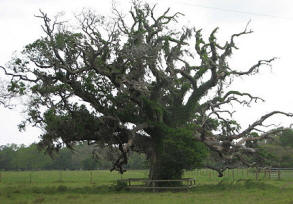 The delight of my life was the dear season and hog killing time,
crackling, corn bread, hot biscuits, and peach preserves. My grandfather
had spent a lot of his boyhood in New Orleans and was a superb cook.
When he went into the kitchen to prepare some of his famous dishes, the
servants cleared out. Of all the dishes I remember best his crab gumbo,
his squirrel stew and the oysters which the blacks brought up from the
Gulf were my favorites. These he prepared in a half dozen ways. The
shells were used to make walks. He taught me how to open oysters and how
to clean a crab, to fish for perch, cut a branch from a willow tree, put
a fish on it and hang it half way in the water to keep fresh until you
were ready to go home, but sometimes water moccasins would swim along
and carry the fish away. He taught me how to troll for trout, how to
crab, how to keep the crabs in a wet gunny sack until time to cook them,
and how to pick them up so they wouldn't hurt me.
The delight of my life was the dear season and hog killing time,
crackling, corn bread, hot biscuits, and peach preserves. My grandfather
had spent a lot of his boyhood in New Orleans and was a superb cook.
When he went into the kitchen to prepare some of his famous dishes, the
servants cleared out. Of all the dishes I remember best his crab gumbo,
his squirrel stew and the oysters which the blacks brought up from the
Gulf were my favorites. These he prepared in a half dozen ways. The
shells were used to make walks. He taught me how to open oysters and how
to clean a crab, to fish for perch, cut a branch from a willow tree, put
a fish on it and hang it half way in the water to keep fresh until you
were ready to go home, but sometimes water moccasins would swim along
and carry the fish away. He taught me how to troll for trout, how to
crab, how to keep the crabs in a wet gunny sack until time to cook them,
and how to pick them up so they wouldn't hurt me.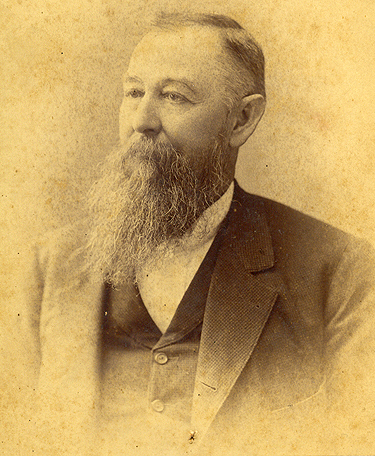 Dr. C. H. Williams died at the hospital in this city about one o'clock
yesterday at the age of 78 years and 28 days.
Dr. C. H. Williams died at the hospital in this city about one o'clock
yesterday at the age of 78 years and 28 days.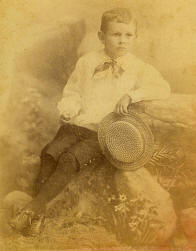 Dr. Williams was married a second time to Mrs. Alice B. Heidt, a
granddaughter of Dixon H. Lewis of Alabama, and a sister of the wife of
the late Judge E. S. Rugeley; and this union was blessed with five
children only one of whom is living, Carlisle H. Williams, now living in
San Antonio, in the Railway Service. Dr. Williams' present wife was Mrs.
Nannie Gunn of Virginia. They were married in 1914.
Dr. Williams was married a second time to Mrs. Alice B. Heidt, a
granddaughter of Dixon H. Lewis of Alabama, and a sister of the wife of
the late Judge E. S. Rugeley; and this union was blessed with five
children only one of whom is living, Carlisle H. Williams, now living in
San Antonio, in the Railway Service. Dr. Williams' present wife was Mrs.
Nannie Gunn of Virginia. They were married in 1914.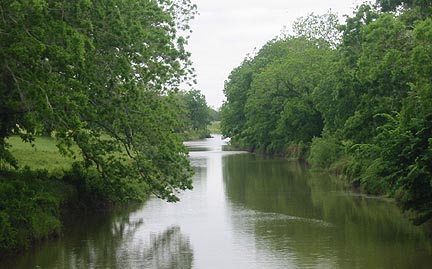 His home for a life-time was the old
homestead plantation on Caney, the erstwhile scene of many a true
Southern hospitality which was know only in those days and which has
never since had or known an equal.
His home for a life-time was the old
homestead plantation on Caney, the erstwhile scene of many a true
Southern hospitality which was know only in those days and which has
never since had or known an equal.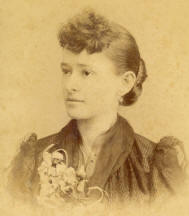 On
Thursday, February 4th, about 2 o'clock, just after dinner was over and
the family was gathered around a heating stove, lightning struck the
house of Mr. Johnie Rugeley and their escape from instant death, at
least some members of the family, seems to be nothing less than
miraculous. They were around the stove, Mr. and Mrs. Rugeley and baby
and Walter Millican. The lightning struck the upper part of the stove,
following it down into the stove, tore several joints of the pipe all to
pieces, overturned the stove, then followed along where the floor and
ceiling met for a ways and tore a piece of weather boarding off from the
sill, up for ten feet or more. Shattering the weather boarding into
splinters and throwing the splinters for some distance. Broke several
windows all to pieces and shattered every lamp shade in the house. There
was no fire in the stove but a lot of ashes and Mr. Rugeley thinks the
ashes saved their lives, as they turned the current of the lightning
outwards, and they were all in front of the stove and not more than four
feet distant. The jar was awful, everybody was stunned and it was
several minutes before they could hear or realize what had happened. The
current of lightning melted holes in the stove pipe, did not hurt the
sill of the house but split up a live oak block. He says he can't
understand how the current of electricity got out of the back of the
stove as it did, without breaking the stove, which it did not injure.
On
Thursday, February 4th, about 2 o'clock, just after dinner was over and
the family was gathered around a heating stove, lightning struck the
house of Mr. Johnie Rugeley and their escape from instant death, at
least some members of the family, seems to be nothing less than
miraculous. They were around the stove, Mr. and Mrs. Rugeley and baby
and Walter Millican. The lightning struck the upper part of the stove,
following it down into the stove, tore several joints of the pipe all to
pieces, overturned the stove, then followed along where the floor and
ceiling met for a ways and tore a piece of weather boarding off from the
sill, up for ten feet or more. Shattering the weather boarding into
splinters and throwing the splinters for some distance. Broke several
windows all to pieces and shattered every lamp shade in the house. There
was no fire in the stove but a lot of ashes and Mr. Rugeley thinks the
ashes saved their lives, as they turned the current of the lightning
outwards, and they were all in front of the stove and not more than four
feet distant. The jar was awful, everybody was stunned and it was
several minutes before they could hear or realize what had happened. The
current of lightning melted holes in the stove pipe, did not hurt the
sill of the house but split up a live oak block. He says he can't
understand how the current of electricity got out of the back of the
stove as it did, without breaking the stove, which it did not injure.